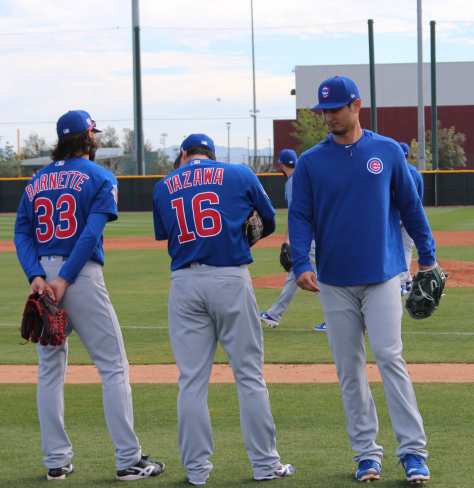On Wednesday, Jan. 29, Tony Barnette announced he is retiring from pro baseball after a career that included six seasons with the Yakult Swallows.
His success with Yakult coincided with a time when the club, tired of seeing their high-quality imports leaving after a couple of years to join the Yomiuri Giants, began handing out solid multiyear contracts. The deal offered Barnette and outfielder Wladimir Balentien, and the development of second baseman Tetsuto Yamada proved instrumental in the Swallows surprising 2015 Central League championship.
In March, I spoke with Barnette in the Chicago Cubs’ clubhouse at their spring training base in Mesa, Arizona. We talked about what worked for him in Japan, and about his relationship with pitching coach Tomohito Ito.
“In Japan, you have to learn how to get guys to swing and miss. And if you can do it there, that plays anywhere. The passion is there, the caring is there. The heart and hustle, it’s all there. That’s one of the things that has stuck with me, keeping that competitive level all throughout the game.”
Tony Barnette on what he learned in Japanese baseball
After a rocky first season as a starter, when he allowed 6.21 runs per nine innings in a hitters’ park in a hitters’ league, there was no guarantee Barnette would even be back for a second season in 2011. He credited the support from then-manager Junji Ogawa and pitching coach Daisuke Araki and the guidance of Araki’s successor, Tomohito Ito.
Tomohito Ito

On March 30, I talked with Ito, currently coaching with the Pacific League’s Rakuten Eagles, about Barnette.
“He basically threw hard when he arrived,” Ito said. “But the slider and changeup were essentially his only secondary pitches, and his command of the change wasn’t that good. Some days he could throw strikes with the slider, and some days he couldn’t.”
“He pitched well in his first start, into the seventh inning, but opponents studied him.”
Ito said that although the results as a starter were not that good, Barnette was showing progress from the middle of the season, working on different pitches that would get him over the hump in Japan.
“He worked on his cutter, he learned a splitter, he threw a two-seamer,” Ito said. “In the process, that cutter became pretty good. By the time the season ended, the club didn’t rate him very highly as a starter, but he was throwing some nasty pitches, so my idea was to use him as a reliever, so I sounded him out about that.”
“He wanted the opportunity and gave it a shot. The fastball worked, and with the cutter, that would get him started in relief. When teams started adjusting, he’d have the splitter, and sometimes a sinker and then a curve that he was beginning to throw.”
Ito, too, pointed out that one reason so many foreign players have had success with the Swallows is the club’s situation on the fringes.
“Yakult is a good place for imported players,” he said. “We know that if the foreign players don’t do well, we’re not going to be successful as a team, so the culture on the team is to stay positive and supportive with them.”
“One of the advantages is that Japan gives players opportunities to try new things.”


